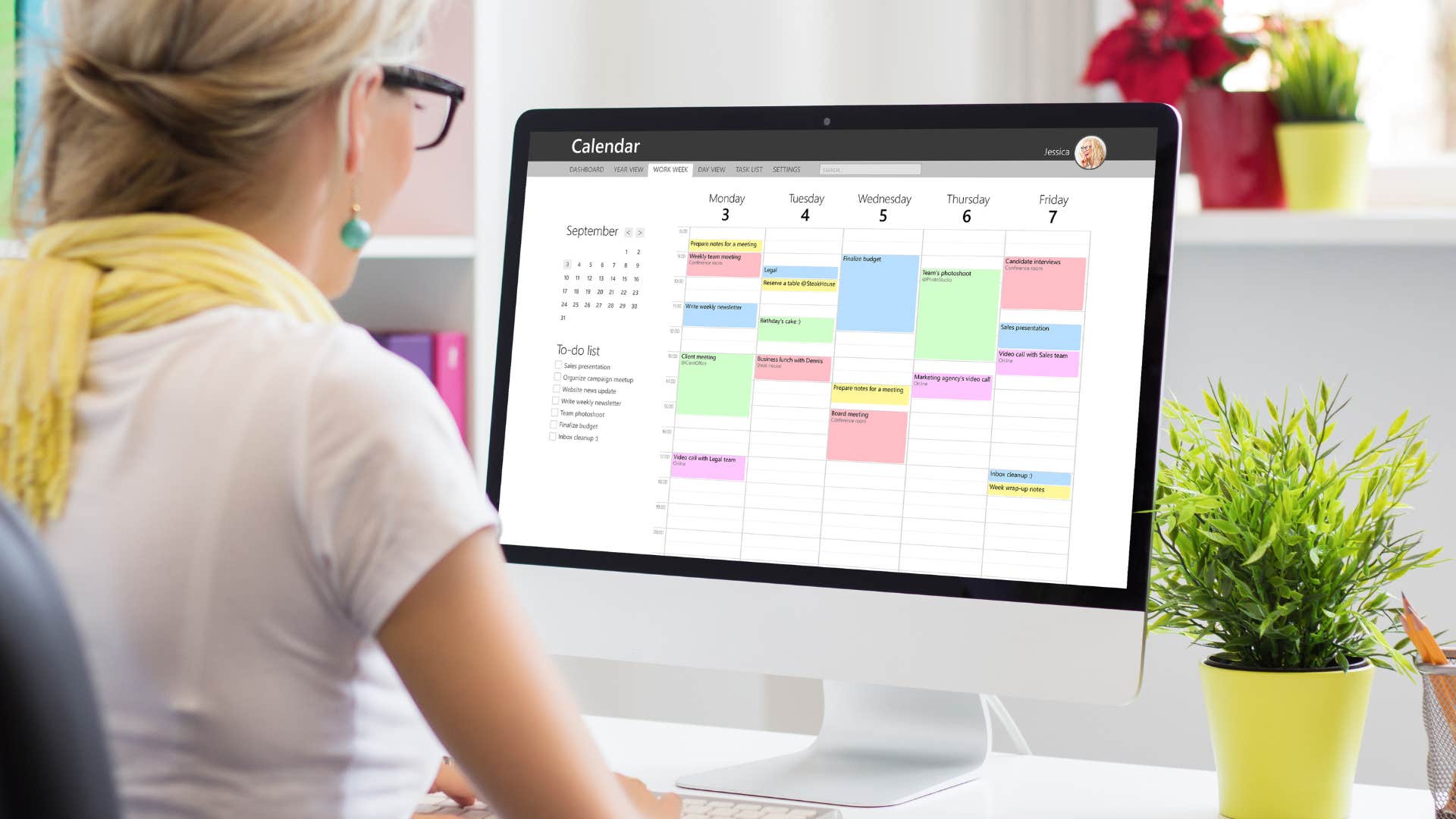People Who Can't Stand Clutter Usually Swear By These 8 Ironclad Rules
When too much stuff becomes overwhelming, here's how and where to start.
 halfpoint | Canva
halfpoint | Canva Do you often wonder how to organize your life when you are feeling overwhelmed by it all? Is the chaos and clutter of your daily life just too much to bear?
Do you want to learn the secret on how to organize your life and find happiness and peace? There are things that you can do to get the chaos under control and get things done, including learning how to be happy with your life and yourself.
People who can't stand clutter usually swear by these 8 ironclad rules:
1. First, take a few deep breaths
 fizkes / Shutterstock
fizkes / Shutterstock
When we are stressed out, the first thing that we do is stop breathing. But we do, unconsciously, hold our breath because of increased tension in the muscles used for breathing. When you are feeling overwhelmed, remember to breathe.
Take deep breaths into your belly, in for 3 seconds and out for 3 seconds. Put your hand over your belly so that you can feel it filling up with air. Do this over and over until you feel a little calmer.
Repeat throughout the day as necessary. It will help you a lot, I promise.
2. Identify the chaos
 Kmpzzz / Shutterstock
Kmpzzz / Shutterstock
One of the reasons it's hard to think straight when you feel overwhelmed is that you don't understand what is specifically overwhelming you.
A client of mine was so overwhelmed with her life. She found that she had no energy to get anything done, she was always yelling at her kids, and she could barely stand to be around her husband.
She figured that she was just too stressed out by her day-to-day living, and she came to me to help her get more organized.
We talked for a bit, and we were able to flesh out exactly what was overwhelming her. She had bills that needed to be paid, but didn’t know when. She had money coming in, but didn’t know how much. On top of that, there were a million little tasks that needed to get done, and she wanted to exercise.
Her mind was just a jumble. She couldn't move forward. The good thing was that once we identified what was overwhelming her, we were able to start working on a solution.
Recognizing the extent of the disarray helps people understand the magnitude of the task ahead, making it easier to break it down into smaller, manageable steps rather than feeling completely overwhelmed by the entirety of the clutter. Countless studies show that a cluttered environment can overload the brain, diverting cognitive resources and making it harder to concentrate on tasks at hand.
3. Put together a list
 fizkes / Shutterstock
fizkes / Shutterstock
An important part of getting things done is to keep a running list. I used to recommend that clients get a small spiral-bound notebook to write down things that need to be done as they think of them.
So many of us remember things that need to get done while driving, but then forget them by the time we get home. If you have a notebook with you at all times, you can keep a running list. And if you have a bound notebook instead of a scrap of paper, you are less likely to lose it!
Of course, many of my clients now like to keep their lists on their phones. Do whatever works for you. I had my client make a list of everything that needed to be done. She added to it as new things came and crossed things out that got done (a very satisfying thing indeed).
Just seeing all of her tasks written down on paper calmed her down because it wasn’t all jumbled around in her brain, but was there in front of her, clear as a bell.
4. Make an action plan
 Ground Picture / Shutterstock
Ground Picture / Shutterstock
Once you have pinpointed the cause of the overwhelm and made a list of the tasks at hand, it is time to make a plan. Without a plan, the overwhelm usually doesn't just disappear. It often gets worse.
For my client, she knew that she had to pay her bills. We worked together to first figure out what was coming in when because understanding that she had some money helped relieve the anxiety around having to parcel it out.
Once we had figured out how much money she had, we built a calendar of what was coming in when and what was due when, and then mapped out a plan to make sure everything was paid on time.
When she paid a bill she crossed that one off. When a new one came in she added it. Her bills were organized on her calendar, instead of jumbled in her brain, and they got paid!
Following a decluttering plan, even partially, fosters a sense of accomplishment, boosting self-esteem. A tidy space can be visually pleasing and promote positivity. Research has shown a definitive link between cluttered environments and feelings of depression and fatigue.
5. Set up a calendar and plan your time
 Kaspars Grinvalds / Shutterstock
Kaspars Grinvalds / Shutterstock
The most important part of an organized life is a calendar and a schedule. I encouraged my client to sit down every Sunday night with her calendar and her list and chart out everything that is happening in the week ahead.
What do I mean by everything?
- Her work schedule
- Her kids’ schedule
- Any appointments that her family might have
- Time for herself
- Time for her and her spouse
- Time spent on social media
- Things from her list
- Anything else that might need to be accounted for
Once she makes her schedule, she underlines in red those things that are priorities and cannot be moved. As the week progresses, she looks at her calendar daily to adjust it as necessary, but if something must get moved, it gets moved immediately so that it doesn’t fall off her calendar and get forgotten.
She makes her calendar, she keeps it with her, she updates it regularly, and makes it the blueprint of her life.
6. Call in some backup
 Yuri A / Shutterstock
Yuri A / Shutterstock
It is essential for women overrun by chaos to get help where they need it. Some women struggle with keeping the finances straight or cleaning the house, or cooking dinner.
If you need help, get it. Find someone to help you clean or cook, or manage your money. It’s really okay to not do everything yourself.
If an accountant or a cleaning lady is not in your budget, figure out some other way to get help. Your partner and your kids are the most obvious first choices in the help department. They can all help with the cooking and the cleaning and maybe even the finances. They may complain, but they can do it.
You can also call on your friends to support you and you can support them as well. When my kids were young, the moms all took turns after school taking the kids to various activities. Each of us committed 1 day a week to being the driver, leaving the other 4 days after school open for work or other things.
Either way, you don't have to do everything yourself. Ask for help. You will be glad you did. Enlisting support from friends, family, or professional organizers can alleviate the emotional burden of decision-making and provide practical assistance with the physical tasks of decluttering.
A 2022 study showed that this can lead to a greater sense of accomplishment and control over one's environment, contributing to improved mental clarity and reduced stress levels.
7. Follow through
 Krakenimages / Shutterstock
Krakenimages / Shutterstock
The most important part of making a plan is following through. Even the best laid out plans don’t work if you don’t follow through.
I have a client who is constantly overwhelmed by her life. She can’t keep her apartment clean, has a difficult time keeping appointments, struggles to do things that involve any planning, and would rather just stay in bed all day.
We made a plan for her to hire someone to clean her apartment once a week and to spend 10 minutes a day neatening up. She was so excited about the plan. And then she didn’t do it.
And her apartment stayed a mess. And she continued to be overwhelmed and became even more overwhelmed because she had let herself down by not doing it.
So make sure that you follow through on your plans to deal with your overwhelmed feelings. If you don’t your overwhelm could actually truly overwhelm you and that will not be fun.
8. Take care of yourself
 Drazen Zigic / Shutterstock
Drazen Zigic / Shutterstock
More than anything, at the top of the list of how to organize your life when you are overrun by chaos is self-care.
Imagine that you have read the list above and are raring to go — to make a list, to create a plan, to get a calendar, and to get help. You are so excited to get it done and then...you are so tired on Sunday that you spend the day in front of the TV instead and never get started.
Taking care of ourselves is a key to organizing our lives in the midst of chaos. It is important that we get enough sleep every night, eat a diet that includes at least some fresh fruits and vegetables, and that we get at least a little aerobic exercise weekly. If you can add a massage or a pedicure in there, even better.
In order to be able to think clearly and act efficiently, we need to be healthy. These days, it is almost a badge of honor in our society to be so overworked that we are exhausted, but don’t kid yourself. That kind of living is unsustainable and will ultimately stop you short.
So, when you are building your calendar on Sunday night, make sure you make room in there to take care of yourself. If you don’t, you could be doomed to fail.
Now that you know how to organize your life when the chaos is just too much, are you ready to change things up?
Take some deep breaths, right now! Clear your head and make your list. If that’s all you can do, fine. Come back to that list tomorrow and make a plan, build a calendar, and follow through. You can do it!
Mitzi Bockmann is a NYC-based Certified Life Coach who works with individuals who strive to heal their toxic relationships so they can have their happily ever after. Mitzi's bylines have appeared in The Good Men Project, MSN, PopSugar, Prevention, Huffington Post, Psych Central, among many others.

